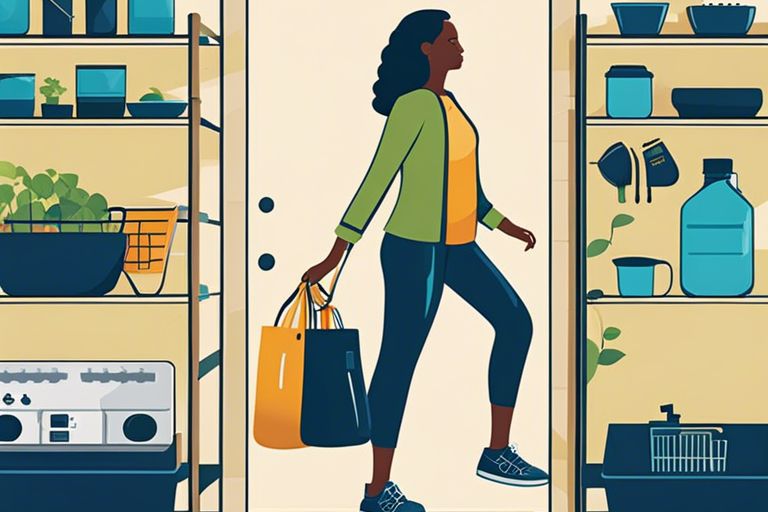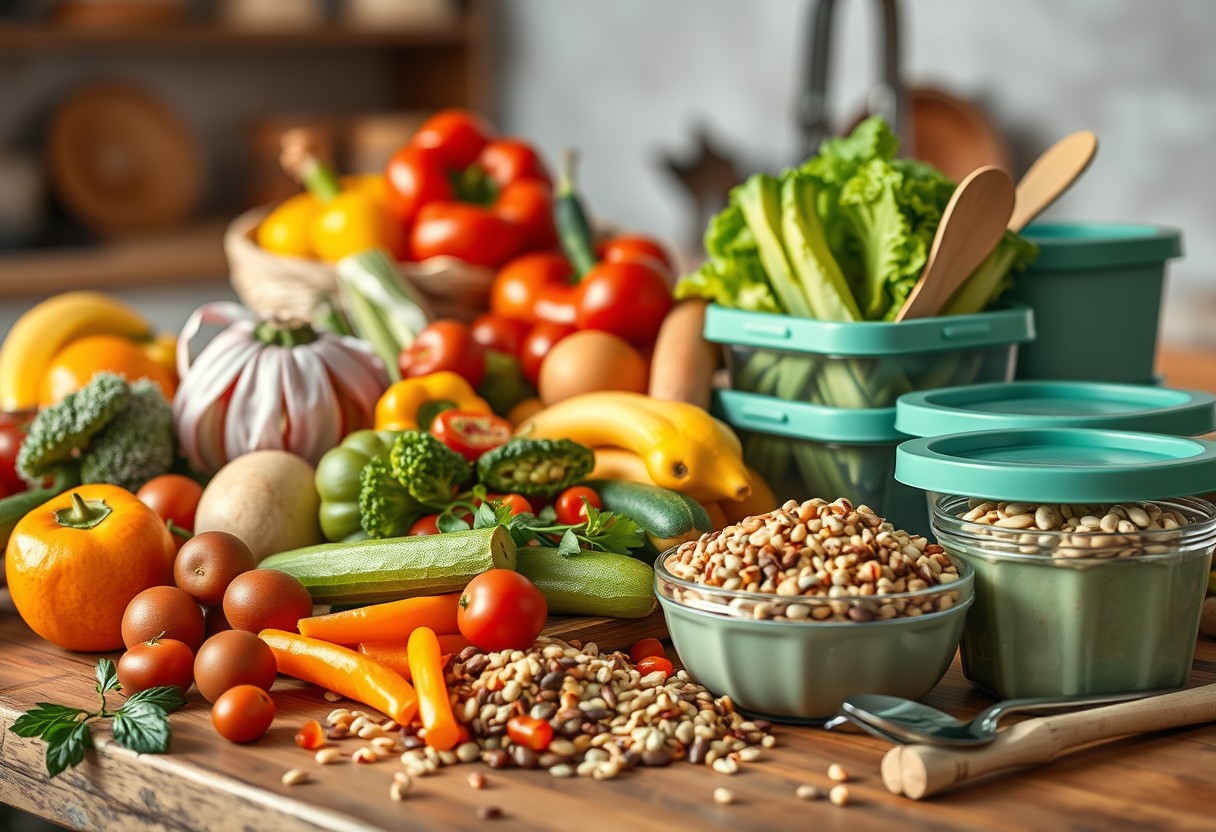Just a few small changes in your daily routine can significantly reduce your environmental impact and promote a more sustainable lifestyle. In this post, you will discover 10 simple green hacks that are easy to implement and will help you make more eco-friendly choices. Whether you’re a seasoned environmentalist or just starting your green journey, these practical tips will empower you to live more sustainably without sacrificing convenience or comfort. Get ready to transform your daily habits and make a positive difference for the planet!
Use Reusable Shopping Bags
To minimize your environmental impact and embrace sustainable living, one of the easiest changes you can implement in your daily routine is to use reusable shopping bags. Unlike single-use plastic bags, which often end up in landfills and oceans, reusable bags are designed to last for years, reducing waste and conserving resources.
When you choose to carry reusable bags, you actively contribute to a cleaner planet. You can find these bags made from various materials, such as cotton, jute, or recycled plastics, giving you options that align with your values. They typically have a much higher capacity than standard plastic bags, allowing you to carry more items while shopping, thereby reducing the number of trips you need to make to the store.
To make this sustainable practice a part of your life, consider keeping a few reusable bags in your car or by the front door so you remember to grab them whenever you head out to shop. You might even want to designate a particular spot in your home for your shopping bags, making them easily accessible. By integrating this simple habit into your routine, you will not only help protect the environment but also set a positive example for family and friends.
Furthermore, many grocery stores and retailers now offer incentives for customers who bring their own bags, providing discounts or rewards for making eco-friendly choices. By getting into the habit of using reusable shopping bags, you can enjoy these benefits while knowing you are making a meaningful contribution to sustainability.

Switch to Eco-Friendly Cleaners
The time has come for you to rethink the products you use to keep your home spick and span. Conventional cleaning products often contain harsh chemicals that can be harmful not only to the environment but also to your health. By switching to eco-friendly cleaners, you can significantly reduce your ecological footprint while still achieving a clean and fresh space.
When you choose eco-friendly cleaners, you’re opting for products that are derived from natural sources or are biodegradable. This means they break down more easily in the environment, reducing the buildup of harmful substances in water systems and soil. Additionally, many green cleaners are formulated without toxins, making them safer for you and your family. No more harsh fumes or skin irritations—just effective cleaning that contributes positively to your living space.
As you explore the myriad of eco-friendly options available, you might consider making your own cleaners using common household items like vinegar, baking soda, and necessary oils. For example, a simple mixture of vinegar and water can serve as a potent all-purpose cleaner. Not only is it cost-effective, but it also ensures that you know exactly what’s going onto your surfaces.
Moreover, many brands now offer eco-friendly products specifically designed to replace traditional cleaners. Look for labels that indicate biodegradable, non-toxic, and cruelty-free credentials. By supporting these companies, you are not only improving your own home environment but also advocating for a market that prioritizes sustainability.
Transitioning to eco-friendly cleaners is a straightforward change you can make today. It’s an necessary step in creating a healthier home and a cleaner planet. With each cleaning session, you can take comfort in knowing that your choices matter. Embrace the power of green cleaning and transform your daily routine into one that reflects your commitment to environmental stewardship.

Consolidate Errands to Reduce Driving
For many of us, running errands can be a routine part of daily life, but these trips can quickly add up—both in time and fuel consumption. By consolidating your errands into one outing, you can significantly reduce the amount of driving you do, ultimately benefiting both the environment and your wallet.
To start, take a look at your weekly schedule and list all the errands you typically run. You might find that you often visit the grocery store, post office, and pharmacy on separate days. By planning your errands in a single trip, you can save fuel and minimize your car’s carbon footprint. Consider plotting your stops on a map to create the most efficient route. This small step can lead to a more sustainable driving habit.
Moreover, when you consolidate errands, you also maximize your time. Instead of making several short trips throughout the week, an organized outing allows you to get everything done in one go, leaving you more time for activities you truly enjoy. The less time you spend in your car, the more time you can dedicate to family, hobbies, or simply enjoying a quieter home environment.
Additionally, consider alternative modes of transportation when possible. Walking or biking to nearby shops not only reduces driving but also adds a bit of exercise into your routine. When you can, opt for public transit; it’s a more eco-friendly option that can help alleviate the stress of driving.
Ultimately, by incorporating the habit of consolidating errands into your routine, you’ll notice a positive impact on both your lifestyle and the planet. Making thoughtful choices about how and when you run errands can lead to significant improvements in reducing your carbon footprint. Start today for a greener, more efficient tomorrow!
Reduce Water Usage in Showers
One of the easiest ways to make a positive impact on the environment is to reduce water usage in your daily showers. You might not realize it, but a long, leisurely shower can consume anywhere from 2.5 to 5 gallons of water per minute. By making a conscious effort to shorten your shower time, you can significantly decrease your overall water consumption.
Start by timing your showers. Consider setting a timer for 5 minutes as a challenge. You might be surprised at how quickly you can wash up, and you’ll quickly adapt to a more efficient routine. Another effective strategy is to install a low-flow showerhead, which can cut water usage by up to 50% while still providing adequate pressure. This small investment not only saves water but can also reduce your utility bills.
Additionally, you can incorporate habits like turning off the water while you lather up with soap or shampoo. This simple change can save gallons of water each time you shower. If you enjoy relaxing under warm water, try using a bucket to capture and reuse the initial cold water while you wait for the temperature to adjust. You can use this water for plants or other non-potable needs.
Making these small adjustments to your shower routine can lead to significant water savings and is a straightforward way to contribute to a healthier planet. Bear in mind, every drop counts, and with your efforts, you can foster a more sustainable lifestyle while enjoying your daily self-care rituals.
Compost Kitchen Scraps
You might be surprised to learn that over 30% of what you throw away can actually be composted. Instead of tossing your kitchen scraps into the trash, consider starting a composting system that not only reduces your waste but also enriches your garden soil. It’s an easy and effective way to transform your daily routine into something beneficial for both you and the environment.
Composting is the natural process of recycling organic material, such as food scraps and yard waste, into a valuable fertilizer for gardens. You can get started right in your kitchen by collecting items like vegetable peels, fruit cores, coffee grounds, and even eggshells. These scraps can contribute to a rich compost that nourishes your plants and helps retain moisture in the soil.
To set up your composting system, you don’t need much. A simple bin or even a designated corner of your yard can work wonders. If you don’t have outdoor space, consider using a worm composting (vermicomposting) setup, which is compact enough for indoor use. Just be sure to balance “green” materials (like your kitchen scraps) with “brown” materials (like dried leaves, cardboard, and paper) to achieve a healthy composting environment.
As you begin composting kitchen scraps, keep in mind what materials are best for your compost pile. Avoid adding any meat, dairy, or oily foods, as these can attract pests and create unpleasant odors. Instead, focus on plant-based scraps and carbon-rich materials. By doing this, you not only eliminate waste but also contribute positively to the ecosystem.
Regularly turning your compost pile helps aerate it, speeding up the decomposition process and enhancing the nutrient quality. Within a few months, you will have nutrient-rich compost that you can incorporate into your garden, giving your plants a natural boost and increasing your garden’s productivity.
Adopting composting as a habit can profoundly alter your daily waste management routine and instill an eco-conscious mindset. Once you start collecting and composting your kitchen scraps, you may find it hard to go back to tossing them in the trash. In addition to benefiting your garden, you’re playing a key role in reducing landfill waste. So, roll up your sleeves and get started on your composting journey—you’ll be doing good for the earth and enjoying a healthier garden!
Use LED Light Bulbs
Any homeowner or renter looking to make a positive impact on the environment should consider replacing traditional incandescent bulbs with energy-efficient LED light bulbs. Not only do they consume significantly less energy, but they also have a much longer lifespan, which means fewer bulbs in landfills and reduced waste overall. By making this small change, you can instantly reduce your carbon footprint while saving money on your electricity bills.
LED light bulbs use at least 75% less energy than incandescent bulbs and can last up to 25 times longer. This means that not only are you using less energy, but you will also find yourself changing bulbs less frequently. With their durability and efficiency, LED bulbs are a smart investment for both your wallet and the planet.
When you switch to LED bulbs, you’ll notice that they come in various styles and brightness levels, so you can easily find the perfect options for your home. Whether you are looking to create a cozy atmosphere in your living room or need bright light in your kitchen, there’s an LED option suited for your needs. Additionally, many of these bulbs are now designed to be dimmable, allowing you to customize the lighting in your space even further.
For more ideas on transforming your lifestyle into a greener one, check out these 10 Sustainable Lifestyle Hacks. You’ll discover additional simple yet effective ways to live more sustainably while improving your daily routine.
In the final analysis, switching to LED light bulbs is a straightforward and effective way to enhance your daily routine while promoting environmental sustainability. By making this switch, you’re contributing to a healthier planet and enjoying the benefits of energy savings and longer-lasting lighting. It’s a win-win situation that you won’t want to miss out on!
Choose Local and Seasonal Foods
If you want to make a significant impact on your daily routine while embracing a greener lifestyle, one of the best changes you can make is to choose local and seasonal foods. By doing so, you not only support local farmers and economies but also reduce your carbon footprint. Transporting food over long distances requires considerable energy, which contributes to greenhouse gas emissions. When you opt for seasonal produce, you are enjoying food at its peak freshness and flavor, while also minimizing the environmental impact.
Local foods are typically grown closer to where you live, meaning they spend less time in transit. This not only ensures that the produce retains more nutrients but also means there’s a smaller chance of using chemical preservatives to prolong shelf life. By making the conscious choice to fill your plate with fruits and vegetables that are in season and sourced locally, you can avoid high-impact practices linked to mass farming and transportation.
One convenient way to start this journey is by visiting farmers’ markets in your area. These markets are a fantastic venue for purchasing fresh produce directly from growers, as well as gaining insight into what’s currently in season. You might find almanacs or charts online that detail which fruits and vegetables are in season in your region. Additionally, you can explore resources like this article on 19 ways how to GO GREEN in small ways every day to help incorporate local and seasonal food choices into your meals.
By focusing on local and seasonal foods, you’re not only fueling your body with the best nature has to offer, but you’re also participating in a sustainable food system. It’s a small change that can lead to a larger positive impact on the planet. Next time you’re shopping for groceries or planning your meals, consider reaching out to local farmers, joining a CSA (Community Supported Agriculture), or simply checking what’s available in your local stores. The benefits of eating locally and seasonally are abundant, and making this shift can truly be a transformative step towards a greener lifestyle.
Be Mindful of Paper Usage
Despite the convenience that paper offers in your daily life, it’s imperative to recognize the impact of your consumption on the environment. From deforestation to increased waste in landfills, the production and disposal of paper products contribute significantly to ecological degradation. By being more mindful of your paper usage, you can make a substantial difference, one small step at a time.
First, consider going digital wherever feasible. Replace printed documents with electronic versions; this includes bills, reports, and even notebooks. Many apps can help you jot down notes, track your tasks, and organize your thoughts without a single sheet of paper. Using digital tools not only reduces your paper footprint but also makes your life more organized and streamlined.
If you must use paper, think about choosing recycled options. Many brands offer paper products made from post-consumer recycled materials, which can help reduce the demand for virgin wood pulp. When you do purchase paper, opt for products that are certified by organizations like the Forest Stewardship Council (FSC), ensuring that the wood used was sourced responsibly.
An effective strategy is to adopt the practice of printing double-sided whenever possible. This small adjustment can cut your paper use in half. Additionally, before hitting that print button, ask yourself if you truly need a hard copy. Can the document be easily referenced on your device instead? By being conscientious about what you decide to print, you can further minimize unnecessary waste.
Also, consider reusing paper whenever possible, such as using the blank side of printed pages for notes or drafts. Educate those around you about the importance of reducing paper waste, and encourage your family, friends, or colleagues to adopt similar habits. The more people are aware of the impact of their paper usage, the more collective change can occur.
Finally, make it a point to recycle any paper you do use. Familiarize yourself with the recycling guidelines in your area to ensure that you are disposing of paper correctly. Observe your recycling habits and evaluate how much paper you generate in a week. By tracking your consumption and finding areas for improvement, you can continually refine your approach, making it a rewarding green hack in your daily routine.
By being mindful of your paper usage, you are taking an important step towards a more sustainable lifestyle. These small changes can add up to create significant positive impacts on our planet, helping to safeguard it for future generations.
Opt for a Plant-Based Diet
Once again, making mindful choices in your daily routine can lead to significant environmental benefits. One of the most impactful changes you can adopt is opting for a plant-based diet. By choosing more plant-based foods and reducing your consumption of animal products, you not only improve your health but also contribute to the well-being of our planet.
First and foremost, plant-based diets are associated with a lower carbon footprint. The production of plant foods typically requires fewer resources compared to meat and dairy. By focusing on fruits, vegetables, grains, legumes, and nuts, you can help decrease greenhouse gas emissions and lessen the strain on agricultural systems. This simple dietary shift allows you to play a part in combating climate change.
Additionally, adopting a plant-based diet can also enhance your overall health. Research has shown that diets rich in whole, plant-based foods are linked to lower rates of chronic diseases, including heart disease, diabetes, and certain cancers. By incorporating more nutritious foods into your meals, you bolster your immune system and increase your energy levels, making you feel better both physically and mentally.
Furthermore, plant-based eating can also fuel your creativity in the kitchen. You’ll discover a myriad of flavors and textures when you experiment with different fruits and vegetables. Consider browsing local farmers’ markets to find in-season produce, which not only supports local agriculture but also enhances your meal preparation experience. Try adding more plant-based meals into your week, such as meatless Mondays, or explore a vast array of recipes online that showcase the versatility of plant-based ingredients.
While it may feel daunting to shift your eating habits, it doesn’t have to be an all-or-nothing approach. Start by gradually replacing some animal-based meals with plant-based options, and experiment with new recipes. Over time, you’ll find that your palette expands, and you’ll enjoy a richer, more diverse diet.
So, as you consider ways to incorporate green hacks into your daily routine, recognize that choosing a plant-based diet can profoundly impact both your health and the environment. It’s a simple yet powerful change that empowers you to make a difference, one meal at a time.
1. Use reusable bags for shopping to minimize plastic waste. 2. Switch to eco-friendly cleaning products for a healthier home. 3. Opt for a refillable water bottle to reduce single-use plastics. 4. Incorporate plant-based meals to lower your carbon footprint. 5. Cycle or walk whenever possible to reduce emissions. 6. Grow your own herbs to promote sustainability and freshness.
Summing up
So, implementing these 10 simple green hacks can significantly transform your daily routine into a more sustainable one. By making thoughtful choices in areas such as energy use, waste management, and eco-friendly products, you can not only reduce your environmental footprint but also inspire those around you to make similar changes. Whether it’s swapping out single-use plastics or adopting energy-efficient appliances, every small adjustment contributes to a larger positive impact on the planet.
As you integrate these green practices into your life, remember that sustainability is a journey, not a destination. Celebrate your progress, no matter how small, and continuously look for opportunities to improve your habits. The more committed you are to adopting an eco-conscious lifestyle, the greater the influence you will have in shaping a greener future for yourself and generations to come. Your choices matter, and together, we can create a healthier planet.



